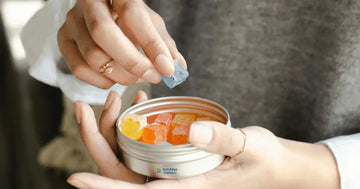Sleep doesn’t always come easily. Whether it’s racing thoughts, a changing schedule, or blue light before bed, millions of people struggle to fall asleep and stay asleep. So, it’s no surprise that sleep gummies, chewable supplements often containing melatonin, magnesium, or calming botanicals, have become a go-to solution. But do sleep gummies work, or are they just a trendy placebo?
Let’s unpack the ingredients, effectiveness, and risks behind these popular bedtime chews.
What Are Sleep Gummies Made Of?
Most sleep gummies include ingredients known to support relaxation or regulate sleep cycles. Melatonin is the most common. It’s a hormone your body produces naturally, and it helps control your sleep-wake cycle. Supplementing with melatonin can support sleep in people who are jet-lagged, working night shifts, or dealing with occasional insomnia.
Other ingredients often include magnesium, L-theanine, GABA (gamma-aminobutyric acid), valerian root, and herbal extracts like chamomile or passionflower. Each targets a slightly different aspect of sleep, from calming the mind to relaxing the muscles.
Some gummies also contain vitamin B6 or CBD, depending on the brand, though not all ingredients are backed equally by science.
How Do Sleep Gummies Actually Work?
When someone asks Do sleep gummies work, the answer depends on what’s in them and what’s causing your sleep trouble.
Melatonin-based gummies may help shift your circadian rhythm if you’re dealing with jet lag or irregular sleep cycles. Magnesium supports muscle relaxation and can ease nighttime cramps or restlessness. Botanicals like valerian root and chamomile are thought to reduce anxiety or tension that can keep you awake.
But gummies are not magic pills. They won’t fix poor sleep habits, overexposure to screens, or late-night caffeine. They may make it easier to fall asleep, but they’re not a cure for chronic insomnia or serious sleep disorders.
For some people, the act of having a nighttime ritual (like taking a gummy) can help signal the brain that it’s time to wind down, which adds to the effectiveness, even if partly psychological.
Are Sleep Gummies Safe?
Most sleep gummies are considered safe for short-term use in healthy adults. Melatonin is non-habit forming and generally well-tolerated, especially at lower doses (typically 1–5 mg). Some people may feel groggy the next morning or experience vivid dreams if the dose is too high.
If a product contains multiple ingredients, it’s harder to pinpoint which one is helping, or causing side effects. For example, valerian root can interact with sedatives or anti-anxiety medication. Magnesium can cause digestive discomfort in some individuals if taken in excess.
That’s why it’s critical to purchase from brands you trust. At Rock Ridge Pharmacy, formulas like the Best Rest Gummy are pharmacist-approved, clean-label, and clearly dosed, so you know exactly what you’re getting with each chew.
Are There Any Risks?
If you’re taking other medications or managing a health condition, always talk to your doctor before adding sleep gummies to your routine. People who are pregnant, breastfeeding, or under age 18 should also consult a healthcare provider before using melatonin or herbal sedatives.
Taking high doses of melatonin regularly could suppress your body’s own production over time, although this concern is still debated among experts. Some gummies may also contain sugar, artificial dyes, or additives that aren’t ideal for long-term use.
When possible, go for third-party tested products with simple, transparent ingredient lists. Rock Ridge Pharmacy carefully curates its sleep support collection to align with these standards.
When Do Sleep Gummies Work Best?
Sleep gummies may be most effective for people with:
- Occasional insomnia or difficulty falling asleep
- Jet lag or changing work schedules
- Mild anxiety that interferes with rest
- Trouble winding down due to overstimulation or screen exposure
They’re a supplement, not a solution. If poor sleep stems from stress, diet, or chronic pain, gummies might help, but they won’t resolve the root cause.
For better results, combine them with good sleep hygiene: keep your bedroom cool and dark, reduce screen time before bed, and stick to a consistent sleep schedule.
Should You Try Sleep Gummies?
If you’re curious about sleep gummies and don’t have a medical condition that might interfere, trying a pharmacist-recommended product could be a low-risk experiment.
Start with a low dose, and see how your body reacts. Look for trusted brands, avoid sugar-packed options, and monitor your sleep quality, not just how fast you fall asleep, but how refreshed you feel the next morning.
Rock Ridge Pharmacy offers pharmacist-selected sleep aids that balance potency with safety. These aren’t candy-store chews, they’re thoughtfully crafted tools to support real sleep in real life.
Final Word
So, do sleep gummies work? They can, especially if you choose the right product and use it the right way. They’re not miracle workers, but they can be a helpful tool when used mindfully. Just remember that no gummy can replace the basics: a regular routine, a healthy diet, and a calm environment.
When you need a supplement you can trust, choose products backed by pharmacists and built on quality. That’s what Rock Ridge Pharmacy is here for: supporting your health, one good night’s sleep at a time.
Disclaimer: This article is for informational purposes only. Always consult your doctor before starting new supplements, especially if you are pregnant, nursing, or on medication.





